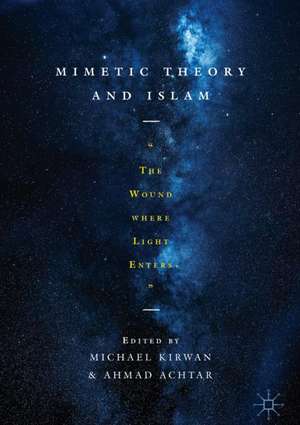Mimetic Theory and Islam: "The Wound Where Light Enters"
Editat de Michael Kirwan, Ahmad Achtaren Limba Engleză Hardback – 17 mai 2019
This volume explores the 'Mimetic Theory' of the cultural theorist René Girard and its applicability to Islamic thought and tradition. Authors critically examine Girard's assertion about the connection between group formation, religion, and 'scapegoating' violence. These insights, Girard maintained, have their source in biblical revelation. Are there parallels in other faith traditions, especially Islam? To this end, Muslim scholars and scholars of Mimetic Theory have examined the hypothesis of an 'Abrahamic Revolution.' This is the claim that Judaism, Christianity, and Islam each share in a spiritual and ethical historical 'breakthrough:' a move away from scapegoating violence, and towards a sense of justice for the innocent victim.
Preț: 573.44 lei
Preț vechi: 674.64 lei
-15% Nou
Puncte Express: 860
Preț estimativ în valută:
109.78€ • 114.11$ • 91.02£
109.78€ • 114.11$ • 91.02£
Carte tipărită la comandă
Livrare economică 06-20 februarie 25
Preluare comenzi: 021 569.72.76
Specificații
ISBN-13: 9783030056940
ISBN-10: 3030056945
Pagini: 167
Ilustrații: X, 178 p.
Dimensiuni: 148 x 210 mm
Greutate: 0.45 kg
Ediția:1st ed. 2019
Editura: Springer International Publishing
Colecția Palgrave Macmillan
Locul publicării:Cham, Switzerland
ISBN-10: 3030056945
Pagini: 167
Ilustrații: X, 178 p.
Dimensiuni: 148 x 210 mm
Greutate: 0.45 kg
Ediția:1st ed. 2019
Editura: Springer International Publishing
Colecția Palgrave Macmillan
Locul publicării:Cham, Switzerland
Cuprins
Ch. 1. 'The Wound Where Light Enters', Michael Kirwan and Ahmad Achtar.- Ch. 2. 'Islamic Anthropology, based on Key Passages in the Qu'ran', Zekiriji Seijdini.- Ch. 3. ‘Adam and Eve in the Qur’an: a Mimetic Perspective’, Ahmad Achtar.- Ch. 4. ‘The Becoming of a Model: Conflictive Relations and the Shaping of the Qur’anic Ibrahim’, Michaela Neulinger.- Ch. 5. ‘Fathers and Sons, Sacrifice and Substitution: Mimetic Theory and Islam in Genesis 22 and Sura 37’, Sandor Goodhart.- Ch. 6. ‘From Structure to Interpretation of the Joseph Sura’, Michel Cuypers.- Ch. 7. ‘Islam, Violence and Acquisitive Mimesis: a Girardian Perspective’, Malise Ruthven.- Ch. 8. ‘Traditional Christian Images of the Prophet: a Mimetic Rivalry?’, Roman Siebenrock.- Ch. 9. ‘Spiritual Love and Sacred Suffering for: Mimetic Theory from a Shi’a Perspective’, Habibullah Babaei.- Ch. 10. 'The Philosophy of Dialogic Engagement: Two Muslim Dialogue Thinkers vis-à-vis Mimetic Theory', Oemer Sener.- Ch. 11. ‘Islam and Islamism in the Mirror of Girard’s Mimetic Theory’, Thomas Scheffler.- Ch. 12. 'Prison Violence in France and Mimetic Theory', Yaniss Warrach.- Ch. 13. ‘Muslim Brotherhood, Social Justice and Resentment’, Wilhelm Guggenberger.- Ch. 14. '"Vox victima, vox moderna?": Modernity and Its Discontents', Michael Kirwan.
Notă biografică
Michael Kirwan is a Jesuit priest who taught theology at Heythrop College (University of London), and is now an associate professor at the Loyola Institute, Trinity College, Dublin. He is the author of Discovering Girard (2004), and Girard and Theology (2009).
Ahmad Achtar taught Islamic Studies at Heythrop College, and is currently a research associate at the School of Advancd Study (University of London).
Ahmad Achtar taught Islamic Studies at Heythrop College, and is currently a research associate at the School of Advancd Study (University of London).
Textul de pe ultima copertă
This volume explores the 'Mimetic Theory' of the cultural theorist René Girard and its applicability to Islamic thought and tradition. Authors critically examine Girard's assertion about the connection between group formation, religion, and 'scapegoating' violence. These insights, Girard maintained, have their source in biblical revelation. Are there parallels in other faith traditions, especially Islam? To this end, Muslim scholars and scholars of Mimetic Theory have examined the hypothesis of an 'Abrahamic Revolution.' This is the claim that Judaism, Christianity, and Islam each share in a spiritual and ethical historical 'breakthrough:' a move away from scapegoating violence, and towards a sense of justice for the innocent victim.
Caracteristici
Offers mimetic readings of Qu'ranic and Biblical passages Explores mimetic resonances within the wider Islamic Tradition Examines contemporary themes through a Girardian lens
